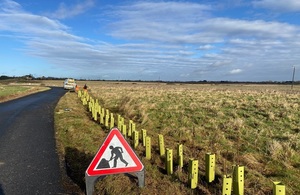International Women’s Day 2022
Officers and civilian staff from across the Ministry of Defence Police (MDP) have been sharing their pledges to #BreakTheBias, the theme for this year’s International Women’s Day (8 March), as we reflect on our collective commitment to help level the playing field and continue to build an environment where women can thrive at work and within the communities we serve and protect.
MDP officers and staff sharing their #BreakTheBias pledges. Crown copyright.
Improving the representation of women in firearms roles across UK policing continues to be a challenge nationally. In the MDP, 11% of our Authorised Firearms Officers and 64% of our civilian staff are women, working in a range of roles and specialisms throughout the force. We have female representation in almost all ranks and grades across our organisation, up to Assistant Chief Constable and Civil Service Grade 6.
The representation of women in the MDP shows how we are “breaking the bias”, given the stereotypical perception that being an armed police officer is a “job for the boys” only. There is, however, still much more to be done and we’re working to encourage more women to join us and to ensure equitable and fair treatment and support for all serving female officers and civilian staff.
We recognise the importance of a working environment free from prejudice and where everyone feels valued. As a police force, we’re committed to promoting inclusivity and tackling any unacceptable behaviour, within and around the sites and communities we serve and protect, providing a policing service that is inclusive, professional, and ethical, working together with stakeholders and partners to provide support and keep women safe.
Chief Inspector McGlinchey with her #BreakTheBias pledge. Crown copyright.
We all have a role to play in driving forward positive change, calling out unacceptable conduct, breaking gender biases, questioning stereotypes and celebrating the achievements of women in the MDP and more widely in society.
New Assistant Chief Constable Melanie Dales said:
During my short time with the MDP so far, I have met some great female MDP role models and seen evidence of positive ongoing work to continue building a truly inclusive working environment and culture, within which women are valued and can progress to their full potential.
I am also very pleased to see the work that the MDP are developing as part of the national Violence Against Women and Girls strategy, both within our own Force and more widely in support of the national Enough campaign. Nobody should be bystanders. We can all do our bit to keep women and girls safe, and as police officers we must call out, challenge, report and act against any behaviour that betrays our professional standards or that concerns us.
As the new MDP Gender Champion, I look forward to working with our dedicated staff and teams across the organisation and within the wider MOD, to further progress activity to remove barriers and identify initiatives to improve the lived experience for women in the MDP and Defence.
Here’s just some of the things we’re doing to “break the bias” and support continuous growth and development of an inclusive culture in the MDP:
-
The MDP Gender Network aims to improve the lived experience – including engagement, development, and promotion opportunities – for women in the force and those who support them. The Network provides input on policies and processes, and contact points, as a safe space for members to raise any issues or share ideas and thoughts.
-
Collaborative working with other networks and associations within Defence, the Civil Service and policing, including the Defence Gender Network and the British Association of Women in Policing (BAWP)
-
provision of a dedicated Force Maternity Coordinator, on a voluntary basis, providing guidance, advice and support to female officers going on or returning from maternity leave, as well as support and guidance in relation to paternity, adoption, and shared parental leave
-
engaging our staff networks, including the Gender Network, in an independent assessment of current MDP shift patterns, to develop options to improve efficiency and effectiveness and support flexible working
-
developing our mentoring processes and positive action activity, to support recruitment and staff development in the coming year and beyond
Further information
During Women’s History Month throughout March, on Facebook and Twitter, we’ll be…
-
reflecting further on what we’re doing to help #BreakTheBias
-
supporting and promoting the national Enough Campaign
-
and MDP women will be answering some quick questions on themselves and life in the force, as they share their #MyMDPMinute
Find out more about our commitment to diversity and inclusion in the MDP: we value difference in our force with a difference


